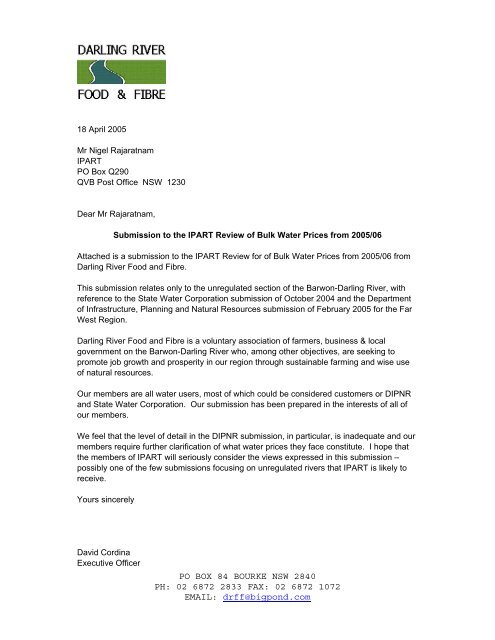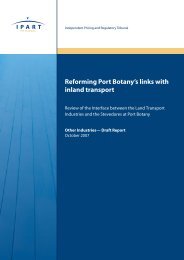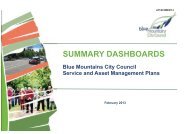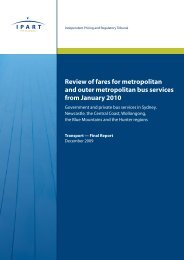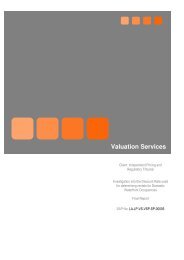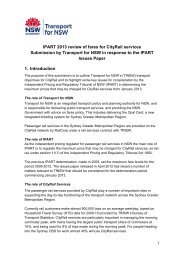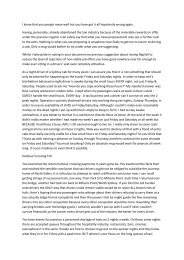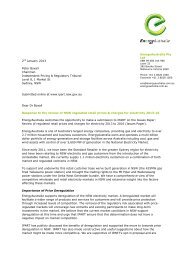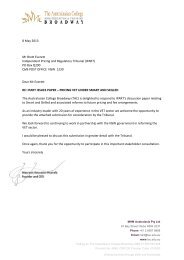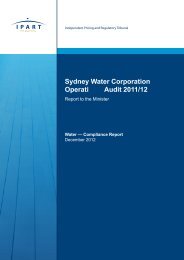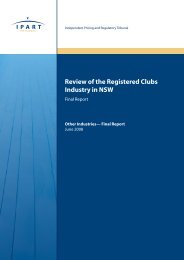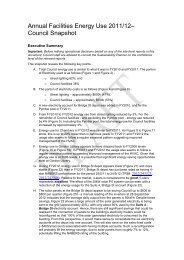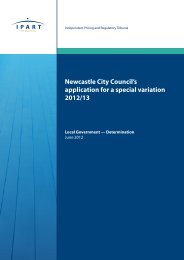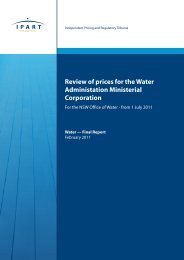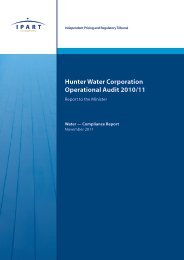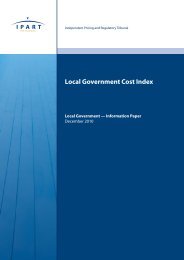Darling River Food and Fibre - S6612 - IPART
Darling River Food and Fibre - S6612 - IPART
Darling River Food and Fibre - S6612 - IPART
Create successful ePaper yourself
Turn your PDF publications into a flip-book with our unique Google optimized e-Paper software.
18 April 2005<br />
Mr Nigel Rajaratnam<br />
<strong>IPART</strong><br />
PO Box Q290<br />
QVB Post Office NSW 1230<br />
Dear Mr Rajaratnam,<br />
Submission to the <strong>IPART</strong> Review of Bulk Water Prices from 2005/06<br />
Attached is a submission to the <strong>IPART</strong> Review for of Bulk Water Prices from 2005/06 from<br />
<strong>Darling</strong> <strong>River</strong> <strong>Food</strong> <strong>and</strong> <strong>Fibre</strong>.<br />
This submission relates only to the unregulated section of the Barwon-<strong>Darling</strong> <strong>River</strong>, with<br />
reference to the State Water Corporation submission of October 2004 <strong>and</strong> the Department<br />
of Infrastructure, Planning <strong>and</strong> Natural Resources submission of February 2005 for the Far<br />
West Region.<br />
<strong>Darling</strong> <strong>River</strong> <strong>Food</strong> <strong>and</strong> <strong>Fibre</strong> is a voluntary association of farmers, business & local<br />
government on the Barwon-<strong>Darling</strong> <strong>River</strong> who, among other objectives, are seeking to<br />
promote job growth <strong>and</strong> prosperity in our region through sustainable farming <strong>and</strong> wise use<br />
of natural resources.<br />
Our members are all water users, most of which could be considered customers or DIPNR<br />
<strong>and</strong> State Water Corporation. Our submission has been prepared in the interests of all of<br />
our members.<br />
We feel that the level of detail in the DIPNR submission, in particular, is inadequate <strong>and</strong> our<br />
members require further clarification of what water prices they face constitute. I hope that<br />
the members of <strong>IPART</strong> will seriously consider the views expressed in this submission –<br />
possibly one of the few submissions focusing on unregulated rivers that <strong>IPART</strong> is likely to<br />
receive.<br />
Yours sincerely<br />
David Cordina<br />
Executive Officer<br />
PO BOX 84 BOURKE NSW 2840<br />
PH: 02 6872 2833 FAX: 02 6872 1072<br />
EMAIL: drff@bigpond.com
REVIEW OF BULK WATER<br />
PRICES FROM 2005/06<br />
SUBMISSION TO <strong>IPART</strong><br />
PO BOX 84<br />
BOURKE NSW 2840<br />
PH: 02 6872 2833<br />
FAX: 02 6872 1072<br />
Email: drff@bigpond.com<br />
April 2005<br />
Prepared by:<br />
Ian Cole<br />
President<br />
&<br />
David Cordina<br />
Executive Officer
1 INTRODUCTION<br />
<strong>Darling</strong> <strong>River</strong> <strong>Food</strong> <strong>and</strong> <strong>Fibre</strong> agrees that water users should contribute to the costs<br />
associated with water operations on the unregulated section of the Barwon-<strong>Darling</strong><br />
<strong>River</strong>. Extractive water users however, such as irrigators <strong>and</strong> industry, are not the<br />
only “water users” who should be responsible for cost recovery of water resource<br />
management. Other legitimate water users may include passive <strong>and</strong> active<br />
recreationists, domestic <strong>and</strong> stock water users <strong>and</strong> the environment in general. Where<br />
these other water users are beneficiaries of the Department of Infrastructure, Planning<br />
<strong>and</strong> Natural Resources’ (DIPNR’s) water resource management, cost recovery for<br />
expenditure should be spread across all user groups.<br />
DIPNR’s submission to the <strong>IPART</strong> Review of Bulk Water Prices from 2005/06 is<br />
disappointing in that it is incomplete <strong>and</strong> proposes to continue its current pricing<br />
regime for an additional water year. The indicative costing information lacks detail<br />
<strong>and</strong> accountability for its financial operations. It is hoped that the proposed “medium<br />
term submission” is provided in a timely manner, clarifying exactly where every<br />
dollar is spent <strong>and</strong> how the Department plans to recovery these costs.<br />
<strong>Darling</strong> <strong>River</strong> <strong>Food</strong> <strong>and</strong> <strong>Fibre</strong> is principally concerned with water pricing on the<br />
unregulated section of the Barwon-<strong>Darling</strong> <strong>River</strong>, however, some of the issues may<br />
apply to unregulated rivers in general. The submission by State Water Corporation<br />
(SWC), who will only be responsible for meter reading <strong>and</strong> billing under contract to<br />
DIPNR, is not particularly relevant to this submission. It would be anticipated,<br />
though, that DIPNR fully detail the costs associated with SWC’s contracted services<br />
in their medium term pricing submission.<br />
2 <strong>IPART</strong> WATER PRICE REVIEW<br />
SWC will contract to DIPNR for meter reading <strong>and</strong> billing services for unregulated<br />
rivers such as the Barwon-<strong>Darling</strong> <strong>River</strong>. They have no other responsibilities in water<br />
delivery or water resource management. Therefore, DIPNR must detail these<br />
contracting costs in their cost estimates.<br />
DIPNR’s submission to the <strong>IPART</strong> Review of Bulk Water Prices from 2005/06 is<br />
incomplete, lacking transparency <strong>and</strong> accountability <strong>and</strong> uses the recent changes in<br />
water management as an excuse for their lack of compliance with <strong>IPART</strong><br />
requirements. The submission promises a medium term pricing proposal in the<br />
second half of 2005 to take effect by 1 July 2006. This seems to be a weak attempt to<br />
DARLING RIVER FOOD & FIBRE INCORPORATED<br />
PO BOX 84 BOURKE NSW 2840<br />
PH: 02 6872 2833 FAX: 02 6872 1072<br />
1
further delay issues that <strong>IPART</strong> specifically requested a response from DIPNR to in<br />
its 2001 water price determination. Industry has also been awaiting clarification of<br />
these issues since the 2001 determination.<br />
In its submission, DIPNR appears to be attributing most of the Department’s costs in<br />
the Far West to water users. The level of detailed costings provided by the<br />
Department is insufficient to be adequately transparent to water users, as was the case<br />
in their submission (DLWC at the time) to the previous bulk water pricing review.<br />
Specific comments are presented below.<br />
3 WATER RESOURCE MANAGEMENT (WRM) COSTS<br />
3.1 WRM Operating Costs<br />
In the 2001 determination, <strong>IPART</strong> raised the issue of changes in the former DLWC’s<br />
operating costs, as follows:<br />
‘Given the probability of significant developments within the industry <strong>IPART</strong> is likely<br />
to review in detail the operating costs of DLWC at the next Determination. It notes<br />
that the costs used for this Determination should not be regarded as the benchmark<br />
efficient costs’<br />
In its submission, DIPNR provided “indicative estimates of WRM operating costs<br />
from 2003/04 to 2005/06” (page 4), however, a detailed review of costing information<br />
was not undertaken. DIPNR suggested that this detail will be completed for the<br />
medium term pricing proposal.<br />
Instead, for the current water year, DIPNR propose to charge existing prices adjusted<br />
for CPI.<br />
Recommendation<br />
In the absence of detailed costing analysis, DIPNR should be limited to<br />
charging a maximum of existing prices, without adjustment for CPI.<br />
On page 4, the DIPNR submission states that:<br />
“…it should be noted that only costs relating to recurrent WRM activities, rather than<br />
one off water planning <strong>and</strong> reform costs, have been included in the costing estimates.<br />
The increase in unregulated river WRM costs in part reflects the additional costs of<br />
the metering <strong>and</strong> billing SLA with SWC to take effect from 2004/05 onwards. It also<br />
DARLING RIVER FOOD & FIBRE INCORPORATED<br />
PO BOX 84 BOURKE NSW 2840<br />
PH: 02 6872 2833 FAX: 02 6872 1072<br />
2
eflects increased WRM costs associated with implementation of the planning<br />
provisions of the WMA”<br />
On page 15, DIPNR acknowledged the National Water Initiative (NWI) commitment<br />
to, among other things, achieve pricing transparency (pages 12 & 13). This is a<br />
positive step forward, however this pricing transparency is yet to be achieved.<br />
Recommendation:<br />
Ensure that full pricing transparency, including fully itemized WRM costs, are<br />
included in the medium term pricing proposal.<br />
3.2 WRM Capital Expenditure<br />
The DIPNR submission states that:<br />
“Capex is incurred in maintaining unregulated river infrastructure, such as weirs <strong>and</strong><br />
regulators. In addition, compliance capex (largely for environmental works such as<br />
fish passage) is incurred on these structures.<br />
Annualised WRM costs for minor items of capex <strong>and</strong> capex on unregulated river<br />
structures were included as water delivery rather than WRM costs in the 2001<br />
determination, <strong>and</strong> have not been included in the WRM cost estimates in this<br />
submission. These items of capex, in addition to capital projects capex, will be<br />
reviewed for recovery through WRM charges in the medium term submission.”<br />
(Page 5).<br />
The Barwon-<strong>Darling</strong> <strong>River</strong>, between Mungindi <strong>and</strong> Menindee, has no dams <strong>and</strong> the<br />
weirs that exist were built for a variety of broad community purposes. These<br />
purposes include early river navigation, town <strong>and</strong> railway water supplies, stock <strong>and</strong><br />
domestic use <strong>and</strong> recreational purposes. They were not installed for irrigation<br />
purposes <strong>and</strong> water is not available for extraction for irrigation purposes once the<br />
river has ceased to flow. Irrigators have invested in <strong>and</strong> maintain their own off-river<br />
storages along the Barwon-<strong>Darling</strong> <strong>River</strong> <strong>and</strong> therefore, have no dependence on these<br />
weirs except as ordinary citizens of the relevant communities.<br />
Clearly, the costs associated with these weirs should be a community responsibility<br />
paid by the State. It is unclear, in the DIPNR submission, which user groups are<br />
attributed to these costs.<br />
DARLING RIVER FOOD & FIBRE INCORPORATED<br />
PO BOX 84 BOURKE NSW 2840<br />
PH: 02 6872 2833 FAX: 02 6872 1072<br />
3
Recommendation:<br />
That the review of cost recovery of these capex items in the medium term<br />
submission consider the lack of dependence of irrigators on weirs along the<br />
Barwon-<strong>Darling</strong> <strong>River</strong> <strong>and</strong> ensure that irrigators are not held responsible for<br />
these works.<br />
4 COST SHARING ARRANGEMENTS<br />
4.1 Cost sharing principles<br />
In the 2001 determination, <strong>IPART</strong> moved to a predominantly ‘impacts pays’ approach<br />
to cost sharing (from a mix of impactor pays <strong>and</strong> beneficiary pays in the 1998<br />
determination). This approach was consistent with ACIL’s recommendations.<br />
DIPNR committed to reviewing this approach in the medium term submission.<br />
Many problems on the Barwon-<strong>Darling</strong> <strong>River</strong> are inherited from general human<br />
occupation <strong>and</strong> upstream development, on the tributaries. These upstream impacts<br />
need to be taken into account when looking at the impact of irrigation on the <strong>River</strong>,<br />
<strong>and</strong> the nature <strong>and</strong> cost of any remedial processes.<br />
Therefore, many of the perceived problems on the Barwon-<strong>Darling</strong> <strong>River</strong> which<br />
require expenditure by DIPNR are broader community concerns, which can <strong>and</strong><br />
should be addressed by all sections of the community.<br />
It seems grossly unfair to single out one easily-identifiable group <strong>and</strong> ask them to<br />
carry the cost for problems created by the broader community.<br />
Also, services provided by DIPNR such as water quality monitoring <strong>and</strong> reporting<br />
would still be undertaken if irrigation was never introduced on the Barwon-<strong>Darling</strong>.<br />
That is, this is a service that would be required by the broader community, regardless<br />
of whether or not irrigation existed.<br />
Recommendation:<br />
Some cost share between the different stakeholders needs to be determined<br />
<strong>and</strong> made specific in the DIPNR costings for their medium term submission.<br />
4.2 Legacy Costs<br />
The interpretation of “legacy costs” is also an issue to be reviewed for the DIPNR<br />
medium term submission. In a similar vein to poor maintenance of water<br />
infrastructure, water license over-allocation on the Barwon-<strong>Darling</strong> <strong>River</strong> <strong>and</strong> other<br />
DARLING RIVER FOOD & FIBRE INCORPORATED<br />
PO BOX 84 BOURKE NSW 2840<br />
PH: 02 6872 2833 FAX: 02 6872 1072<br />
4
unregulated (<strong>and</strong> regulated) rivers was created largely as a product of pre-1997<br />
Departmental decisions in light of poor information. Therefore, this problem should<br />
be rectified using Government resources rather than cost recovery from water users.<br />
It is unclear (Page 4) whether DIPNR costs associated with amending the overallocation<br />
of water licenses are being allocated to water users. The additional costs<br />
associated with implementation of the planning, however, are a legitimate cost to<br />
license holders.<br />
Recommendation:<br />
Costs associated with bringing water licensed volumes within Cap be the<br />
responsibility of DIPNR <strong>and</strong> made transparent in their medium term<br />
submission.<br />
5 TARIFF STRUCTURE<br />
DIPNR’s proposal to retain, in the short term, an “access charge” per megalitre of<br />
entitlement in non WSP areas, rather than move to a two-part pricing tariff, seems<br />
reasonable while DIPNR are yet to implement a Cap on diversions on the Barwon-<br />
<strong>Darling</strong> <strong>River</strong>. A two-part pricing tariff should be set to recover fixed annual costs<br />
through an entitlement charge <strong>and</strong> usage dependent costs recovered through the usage<br />
charge.<br />
The problem with unregulated rivers is that costs to DIPNR <strong>and</strong> State Water do not<br />
vary much with water use. Water monitoring may be a source of additional costs with<br />
increasing wateruse, but meter reading would be no more arduous <strong>and</strong> WRM is<br />
unlikely to differ much. Therefore, it would be expected that a two-part water pricing<br />
tariff, once introduced, would have an entitlement charge set to recover relatively<br />
fixed costs <strong>and</strong> a much smaller usage charge for the variable costs.<br />
Recommendation:<br />
Move to a two-part pricing tariff in the year following Cap implementation on<br />
the Barwon-<strong>Darling</strong> <strong>River</strong> that reflects the cost patterns of State Water <strong>and</strong><br />
DIPNR.<br />
DARLING RIVER FOOD & FIBRE INCORPORATED<br />
PO BOX 84 BOURKE NSW 2840<br />
PH: 02 6872 2833 FAX: 02 6872 1072<br />
5


